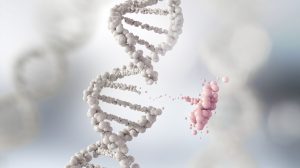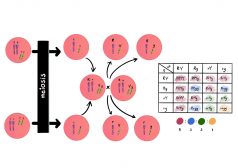Definition
noun
(genetics) A type of mutation wherein the change in gene leads to an atypically new function of the gene
Supplement
Mutations may be classified based on the effects on the function of the gene. Hermann J. Muller, an American geneticist, came up with the following types of mutation by effect on gene function:1
- amorphic or null mutation (amorph)
- hypomorphic mutation (hypomorph)
- hypermorphic mutation (hypermorph)
- antimorphic mutation (antimorph)
- neomorphic mutation (neomorph)
Amorphic and hypomorphic mutations are involved in the loss of gene function due to gene mutation. Hypermorphic, antimorphic, and neomorphic mutations are associated with the gain of gene function.
Neomorphic mutation or neomorph leads to a new gene activity. It differs from hypermorphic and antimorphic mutations in a way that the dose of wild-type has no effect on the phenotype. An example of this type of mutation is the AntpNs mutation resulting in the expression of Antp from a transposable element in antennae of Drosophila.2
Synonym(s):
- neomorph
Compare:
See also:
Reference(s):
1Muller, H. J. 1932. Further studies on the nature and causes of gene mutations. Proceedings of the 6th International Congress of Genetics, pp. 213–255
1Garriga, G. 2008. Reading: 719-729 & lecture notes. mcb.berkeley.edu/courses/mcb140/garriga-08/phenotype-function.pdf Link







